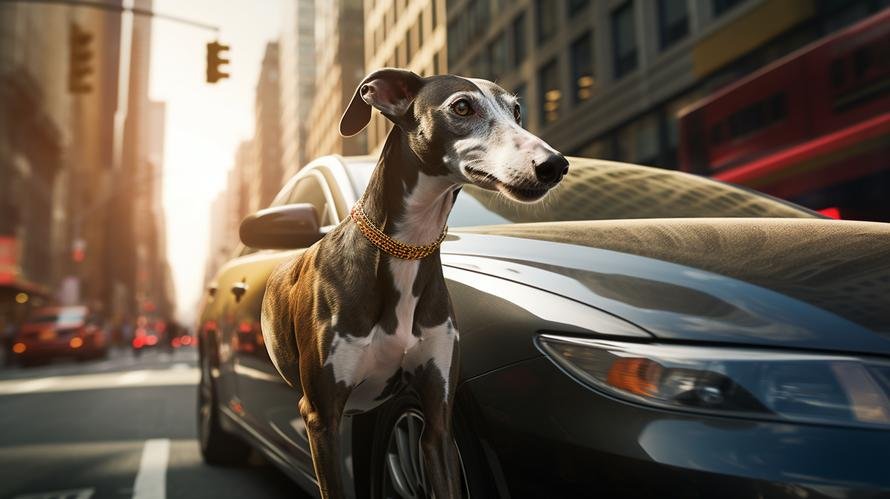Imagine a dog that is a champion napper, a couch potato’s pal, yet also one of the world’s fastest canine athletes. That’s the greyhound for you, a breed with an ancient lineage tracing back to the Pharaohs of Egypt. They were bred to chase fleet-footed prey like deer and hare, which explains their slender, aerodynamic frames and love for a good sprint. But does their Olympic-runner status make them high-maintenance pets? The answer might surprise you.
Greyhounds have a prestigious reputation, having been the dog of choice for aristocrats for centuries. Their sleek coats, graceful gait, and noble demeanor have made them icons of canine royalty. You could say that their maintenance level is as misunderstood as their quiet, almost mysterious personalities.
Their need for speed, for instance, is often mistaken for a need for endless activity. But unlike their distant cousin the Energizer Bunny, greyhounds don’t need to keep going and going. In fact, they might be described as professional loungers. A good run in a safe, enclosed area once or twice a week is generally enough to keep them happy. Indoor living suits them just fine, and they could easily be mistaken for a decorative rug as they snooze the day away.
One might assume that such an elegant dog would require a spa-day worth of grooming regularly, but think again. Greyhounds have short, smooth coats and they are relatively low shedders. This makes their grooming routine simple and stress-free. Give them a quick brush once a week to remove dead hair and keep their coat shiny, and you’re good to go. They do enjoy a good bond-building, pampering session, but they won’t turn their noses up if it’s not a daily occurrence.
Training a greyhound is another area where you might expect high maintenance, but they are often eager to please and respond well to positive reinforcement techniques like treats and praise. They’re sensitive souls, so a harsh tone can be more upsetting than motivating. Patience and consistency are your best friends when training a greyhound.
Dental hygiene, however, is an area where greyhounds do require regular maintenance. Their teeth can be prone to plaque buildup and therefore need brushing several times a week. This might seem tedious, but establishing a dental hygiene routine can prevent health issues and save you money on veterinary bills in the long run.
Greyhounds are also creatures of routine. They thrive on knowing what to expect and when to expect it. This predictability helps them feel secure and could be interpreted as high-maintenance by some. But all it really means is that once you’ve established a routine, you should try to stick to it. Small price to pay for keeping this serene, graceful companion content, right?
Now let’s talk diet because, after all, a sprinter’s body is their temple. You don’t have to go out and hunt deer or hare for your domestic racer, but you do need to provide a balanced diet to maintain their svelte figure and ensure they have the right fuel for those bursts of speed. High-quality commercial dog food will usually suffice, with some supplementation as advised by your vet.
Apartment dwellers, rejoice! Greyhounds are famously good for apartment living. They don’t bark excessively and are usually quite polite to neighbors. However, they do need soft places to rest their somewhat bony bodies. So, yes, you might need to invest in a plush dog bed (or three) to keep them off your couch, unless you’re okay with sharing your spot with 70 pounds of love and affection.
One aspect that may need a bit more care is their thin skin, which makes them subject to cuts and nicks. Thus, when they do their zoomies or sprint around in an enclosed area, it’s best to ensure the space is safe and free of sharp objects. A small investment in their play area’s safety can prevent injury and unnecessary vet visits.
Lastly, the greyhound’s sensitivity extends to their emotional needs. They’ve been bred for companionship as much as performance, which means they form strong bonds with their humans. They might not do well if left alone for long periods and can develop separation anxiety. Ensuring that they have a consistent presence, be it human or a canine companion, helps them feel secure and loved.
To wrap it up, greyhounds are a bit like the secret agents of the dog world – cool, calm, collected, and surprisingly low maintenance. They have specific needs, like any breed, but they are far from the divas of the dog world that one might expect them to be. Ownership of a greyhound is about understanding and meeting their simple needs – a secure environment, a soft resting place, a predictable routine, and a loving family. Fulfill these, and you’ll have a loyal, gentle friend who’s content to be the heart (and art) of your home. So, high maintenance? Not quite. Highly rewarding? Absolutely.



